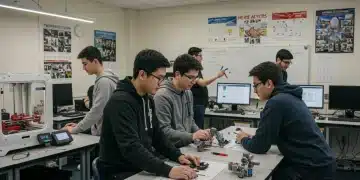Insights on high school coding classes: why they matter

Anúncios
Coding classes in high school enhance problem-solving skills and open diverse career opportunities in technology and other fields, making them essential for students today.
Insights on high school coding classes show how these courses can significantly shape students’ futures. Have you ever wondered how coding can empower teens in a digital world? Let’s dive into this topic!
Anúncios
Benefits of coding classes in high school
High school coding classes offer numerous benefits that go beyond just learning to code. Students gain essential skills that prepare them for the future job market. These classes encourage creative thinking and problem-solving capabilities, essential components in today’s tech-driven world.
Why learn coding? Understanding the basics of programming opens up many opportunities. Students learn how to create websites, apps, and even games. This knowledge not only enhances their resumes but also boosts their confidence. In addition to technical skills, coding promotes teamwork and collaboration.
Anúncios
Skills Developed in Coding Classes
- Problem-solving skills: Coding teaches how to break down complex problems into manageable parts.
- Logical thinking: Students learn to think systematically, which is useful in other academic subjects.
- Creativity: Coding is not just about numbers; it encourages students to innovate and create.
- Collaboration: Many programming projects require teamwork, teaching communication and cooperation.
Although some may think coding is only for those interested in a tech career, coding classes are beneficial for all high school students. They learn to think critically, manage projects, and communicate their ideas effectively. Furthermore, in an age where technology is ubiquitous, these skills are increasingly essential for every student.
This trend is paving the way for a more tech-literate generation. By taking coding classes, students are not just preparing for careers in technology; they are preparing for a future where digital skills are integral across all fields. Whether aiming for a career in engineering, science, or even arts, the groundwork laid in these classes is invaluable.
Essential programming languages to learn

Learning programming languages is a vital part of coding classes in high school. Certain languages stand out for their accessibility and usefulness in a variety of fields. By focusing on these essential programming languages, students can build a strong foundation for future learning.
One of the most popular languages to begin with is Python. It has a simple syntax, making it great for beginners. Students can quickly start building projects and understanding programming concepts without feeling overwhelmed. Additionally, Python is widely used in data science, web development, and more, keeping it relevant across multiple industries.
JavaScript and Its Importance
JavaScript is another key language that students should consider learning. As the backbone of web development, it allows programmers to create interactive websites. By understanding JavaScript, students can better appreciate how the web works and even get hands-on experience in creating dynamic user interfaces.
Other Notable Languages
- Java: This language is prevalent in enterprise environments and mobile application development.
- C++: Known for its performance, C++ is essential for game development and resource-intensive programs.
- Ruby: With its clean syntax, Ruby is ideal for web development, particularly with the Ruby on Rails framework.
- HTML/CSS: Although not programming languages in the traditional sense, learning these technologies is crucial for web design.
As students explore these languages, they will find that each offers unique advantages. For example, while Python is excellent for general purposes, Java’s versatility shines in software development. The choice of language often depends on specific interests, such as game design or web development.
By equipping themselves with knowledge of these essential programming languages, students not only enhance their technical abilities but also increase their employability in a technology-driven workforce. Learning these skills early on can provide a significant advantage in their academic and career pursuits.
How coding classes enhance problem-solving skills
Coding classes are more than just places to learn programming languages; they are crucial for enhancing problem-solving skills. By navigating coding challenges, students learn to think logically and creatively. These skills are beneficial not only in technical fields but also in everyday life.
When students tackle coding problems, they learn to break down complex tasks into smaller, manageable parts. This step-by-step approach helps them see the importance of planning before executing any task. For instance, when debugging a program, students must identify errors, analyze their code, and test solutions, which sharpens their analytical abilities.
Real-World Problem Solving
In a coding class, students often face real-world scenarios that require critical thinking. They might work on projects that involve creating an app or developing a website tailored to user needs. By doing so, they practice problem-solving skills in a context that feels immediately relevant.
- Collaboration: Working in teams during coding projects teaches students how to communicate effectively and share ideas, further enhancing their problem-solving capabilities.
- Creativity: Coding isn’t just about logic; it requires innovative thinking to come up with new solutions or features that users might need.
- Resilience: Overcoming challenges in coding builds perseverance. Students learn that failure is part of the process, encouraging them to keep trying until they find a solution.
These experiences help students cultivate a mindset focused on solutions rather than problems. They begin to view challenges as opportunities for learning and improvement. This perspective is vital as they move forward in their academic and professional lives.
Through coding, students are not just learning how to write programs; they’re developing strong problem-solving skills that will aid them in various aspects of life. As they continue to practice coding, these skills become second nature, making them adaptable thinkers ready for any challenge.
Future career opportunities through coding education

Coding education opens up a host of future career opportunities for students. As technology continues to evolve, companies increasingly seek individuals with coding skills. Students who embrace coding in high school set themselves on a path to success in various fields.
Many students might think of programming jobs only when considering coding careers, but the reality is much broader. Knowledge of coding can lead to positions in tech companies, startups, and non-tech industries alike. For instance, skills in coding are essential not only for software engineering but also for roles in marketing, finance, and healthcare.
Popular Career Paths
Some exciting career options for those educated in coding include:
- Software Developer: These professionals create applications, from mobile apps to large-scale software solutions.
- Web Developer: Individuals in this role design and maintain websites, focusing on both aesthetics and functionality.
- Data Analyst: Coding is crucial for managing and interpreting data, helping businesses make informed decisions.
- Game Developer: For those passionate about gaming, coding opens doors to creating engaging video games.
Beyond specific job titles, coding enriches students’ resumes. Employers highly value candidates who can think critically and adapt to technological changes. Coding education not only provides technical skills but also fosters creativity and problem-solving abilities. Students learn how to tackle complex challenges, which is beneficial in any career.
Furthermore, the demand for skilled coders is growing. Fields such as artificial intelligence, machine learning, and cybersecurity are expanding rapidly. Students who develop a strong foundation in coding can position themselves as valuable assets in these high-demand industries. With the right skills, they can pursue rewarding careers that offer job security and competitive salaries.
As technology continues to integrate into every aspect of life, the ability to code will only become more valuable. Investing time in coding education today can significantly impact students’ future career paths, opening doors to opportunities they may not yet envision.
FAQ – Frequently Asked Questions about High School Coding Classes
What are the main benefits of taking coding classes in high school?
Coding classes enhance problem-solving skills, promote creativity, and prepare students for various career opportunities in a tech-driven world.
Which programming languages should students focus on?
Students should consider learning languages like Python, JavaScript, and Java, as these are widely used and provide a good foundation for future learning.
How do coding classes improve critical thinking?
By working through coding challenges, students learn to analyze problems, devise solutions, and approach tasks step by step, enhancing their analytical skills.
Can coding skills benefit non-technical careers?
Absolutely! Coding skills are valuable in many fields, including marketing, finance, and healthcare, as they foster analytical thinking and problem-solving abilities.





